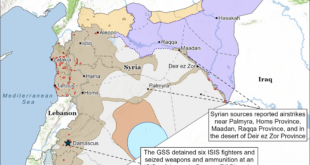‘AL-FATH’ MEANS ‘VICTORY’: The peace talks with the United States may have only emboldened the Taliban to believe it can cut a deal to end the 18-year war that leaves it in a position to control the country and dismiss the U.S.-backed government in Kabul.
“The name of this year’s offensive, Al-Fath or Victory, indicates that the Taliban believes it will soon prevail in the 18 year long conflict against NATO and Afghan forces,” writes Bill Roggio, a senior fellow at the Foundation for Defense of Democracies. “The statement is yet another clear indication that the Taliban will not share power with the Afghan government, but instead seeks to impose its will on the country.”
Roggio has posted the full Taliban statement at FDD’s Long War Journal site and notes that unlike previous years, in which U.S. and NATO forces were the prime target, the Taliban focuses on the Afghan government and security services.
“The Taliban said it seeks to reestablish an ‘Islamic system’ of governance five times in the statement. It also refers to itself four times as the ‘Islamic Emirate,’ the name of the Taliban’s government when it ruled Afghanistan from 1996 to 2001,” Roggio writes. “This is yet another clear sign that the Taliban’s goal is to retake full control of Afghanistan once U.S. and NATO forces leave, and impose its harsh version of sharia or Islamic law on the Afghan people.”
WORST-CASE SCENARIO: The Center for Strategic and International Studies’ Project on Prosperity and Development is out with a new analysis, “Preventing Catastrophe in Afghanistan,” which advocates “a phased and orderly withdrawal of U.S. troops and assistance in accordance with an overall political settlement” in which the United States retains a partnership with any post-settlement Afghanistan.
The policy brief argues that Afghanistan is at an inflection point that holds the risk of catastrophe:
History should serve as a warning that Afghanistan could once again descend into civil war. A hasty withdrawal of U.S. and allied support could lead to the collapse of the Afghan government and create an enabling environment for terror organizations and U.S. rivals, as well as a very costly civil war. Afghan people could lose their social and political rights and freedoms, prompting many to seek shelter abroad—including in the United States. It is plausible that a major terrorist attack of the caliber of the September 11, 2001 attacks be planned against the United States on Afghan soil. This could trigger a future U.S. president to occupy Afghanistan once again, but with fewer allies, lower political appetite, and less moral authority than in 2001.
Good Monday morning and welcome to Jamie McIntyre’s Daily on Defense, written and compiled by Washington Examiner National Security Senior Writer Jamie McIntyre (@jamiejmcintyre) and edited by Kelly Jane Torrance (@kjtorrance). Email us here for tips, suggestions, calendar items, and anything else. If a friend sent this to you and you’d like to sign up, click here. If signing up doesn’t work, shoot us an email, and we’ll add you to our list. And be sure to follow us on Twitter: @dailyondefense.
HAPPENING TODAY: Secretary of State Mike Pompeo is in Texas today, where he is scheduled to meet with Iranian-Americans “to solicit their thoughts” on U.S. policy on Iran and to give a speech at Texas A&M University in College Station.
“His remarks will highlight the impact of diplomacy on daily life and make the case to students that a career at the State Department is a powerful way to serve America,” says the State Department.
TOO SOFT ON IRAN?: No one would accuse Pompeo of being too soft on Iran, or would they? The question centers on whether some U.S. allies will continue to get waivers that allow them to buy Iranian oil despite U.S. sanctions intended to cripple Iran’s oil revenues. Several countries, including India, Japan, China, and Turkey, were granted waivers last year, and President Trump is supposed to decide by the end of next month whether to extend the waivers.
At a Senate Foreign Affairs Committee hearing last week, Ted Cruz, R-Texas, pressed Pompeo over reports that there is an intra-agency dispute between the State Department and the Energy Department about whether to grant the waivers again to keep more oil on the market and gas prices low.
“Right now, Iran is producing roughly 1.2 million barrels of oil a day that is generating billions of dollars that is funding the ayatollah and I believe endangering our security,” Cruz told Pompeo. “Let me urge you and urge the department unequivocally not to grant the nuclear waivers and not to grant the oil waivers. I think maximum pressure should mean maximum pressure.”
“I think we have been clear about our objective of getting Iran to zero just as quickly as we possibly can. And we will continue to do that,” Pompeo testified.
But over the weekend he complained that some members of Congress were grandstanding on the issue. “People want to tell stories. People want to sell newspapers. I’ve got it. Congressmen will grandstand. I’ve got that, too. The State Department’s going to get it right,” he said during an interview with two reporters on his plane en route to Paraguay, as reported by the Washington Post.
TRUMP READY FOR ROUND 3: Over the weekend, President Trump tweeted that he’s ready to try again to reach a deal with North Korea’s leader over nuclear weapons and appeared unfazed by the lack of progress following the collapse of talks in Hanoi at the end of February.
“I agree with Kim Jong Un of North Korea that our personal relationship remains very good, perhaps the term excellent would be even more accurate, and that a third Summit would be good in that we fully understand where we each stand,” he tweeted.
Last week, Trump met with South Korean President Moon Jae-in, who is trying to arrange his own one-on-one with Kim to restart the stalled talks.
KIM’S PESSIMISTIC: Meanwhile, in a speech to the Supreme People’s Assembly in Pyongyang Saturday, Kim blamed the failure on the U.S. refusal to ease sanctions but said he was willing to try one more time, even as he seemed to hold out little hope for an agreement.
“We will be patient and wait till the end of this year to see whether the United States makes a courageous decision or not, but it will obviously be hard to get a good opportunity like the last time again,” Kim said, according to a translation from the state-run Korean Central News Agency. “What is obvious is that if it sticks to its current political way of calculation, the prospects for problem solving will be bleak and very dangerous.”
Kim did agree with Trump on one thing: They are still on good terms. “Personal relations between he and I are not hostile like the relationship between the two countries, and we still maintain good relations, and if we want, we can send and receive letters asking for each other’s regards any time.”
MORE TROOPS TO THE BORDER: Acting Defense Secretary Patrick Shanahan told reporters Friday the Pentagon stands ready to dispatch more U.S. troops to the border region if President Trump follows through with his pledge to increase the U.S. military presence along the U.S.-Mexico boundary.
“It shouldn’t come as a surprise that we’ll provide more support to the border,” he said in response to a reporter’s question as he prepared to meet with Germany’s defense minister. “Our support is very elastic, and given the deterioration there at the border you would expect that we would provide more support.”
Shanahan said he anticipates the support will be similar to what the military has already provided with several thousand troops, barrier construction, transport, and surveillance.
GRAHAM: MORE TROOPS NOT THE ANSWER: On the Fox program “Sunday Morning Futures,” Sen. Lindsey Graham, R-S.C., said it will take legislation not military muscle to get the border situation under control. “If I were the president, I would send military troops to the border as soon as I could in large numbers. But we’re never going to stop this by just having walls and troops at the border. We have to change our laws so these people stop coming.”
Graham says he’s drawn up a package of legislative reforms he hopes will win bipartisan support. “We have a quirk in our law that if you’re from Central America, you cannot be sent back home as a minor child because of a law on the books that prohibits sending children back from noncontiguous countries,” Graham told Fox’s Maria Bartiromo. “So the only place we can send a child back to is Mexico and Canada. We need to be sending these kids back to Central America, where they come from.”
READY TO DEAL: Meanwhile, House Speaker Nancy Pelosi and Senate Majority Leader Mitch McConnell both say they are ready to sit down together to try to work something out in recognition that there is a real and growing humanitarian crisis along the southern border.
Pelosi, D-Calif., speaking to reporters at the Democratic retreat in Leesburg, Va., said she is “pleased to see” news reports that McConnell, R-Ky., “is ready to talk about” an immigration deal. McConnell told reporters Thursday it is “past time” to negotiate with Democrats on immigration and he is willing to talk to Pelosi about it “now.”
GERMANY’S PLEDGE: German defense minister Ursula von der Leyen said Friday her country intends to meet its NATO commitment to spend at least 2 percent of its GDP on defense but won’t do it by the 2024 deadline.
“We are committed to the 2 percent goal. We will reach 1.5 percent of defense spending as a portion of GDP in 2024 and afterwards we will be moving towards the 2 percent,” von der Leyen said as she prepared to meet with acting Secretary Shanahan.
Germany, which has the strongest economy in Europe, has seen its GDP rise steadily over the past five years; it is now almost $4 trillion as measured in U.S. dollars. Under the 2 percent formula, Germany would need to spend $80 billion on defense, more than any other NATO country excluding the United States.
It now spends 1.2 percent of GDP on its military, about $50 billion, behind the United Kingdom ($61 billion) and France ($51 billion), according to NATO figures.
RAND REPORT RECOMMENDS UNCONVENTIONAL DEFENSE: A new RAND Corporation report concludes that unconventional defense plans could help deter and counteract Russian aggression against Estonia, Latvia, and Lithuania.
The three Baltic states are said to be vulnerable to Russian intimidation and hybrid warfare. The report recommends “unconventional warfare capabilities” to complement NATO’s existing conventional defense efforts.
The authors find that a wide range of technologies could enhance the effect of so-called “total defense” and unconventional warfare, ranging from cyber capabilities, cameras, printers, and small UAVs to night vision devices, tactical and long-range mobile communications systems, nonlethal weapons, small arms and explosives, and anti-aircraft and anti-tank weapons.
NEW FACES AT ISW: The Institute for the Study of War has announced that retired Army Col. Ketti Davison is joining ISW as its director of innovation and tradecraft. Davison spent 30 years in the Army, with a background in military intelligence, planning, and operational design. She previously commanded the Joint Intelligence Center Central Command and the National Ground Intelligence Center. She also served as the Army chief of staff’s director of research and analysis and was a senior military fellow at the Center for a New American Security.
Mike Carroll, a fundraising professional with more than 30 years of development experience, is joining ISW as its new director of development. From 2012 to 2017, he served as the vice president for institutional advancement at the National World War II Museum in New Orleans.
 Eurasia Press & News
Eurasia Press & News



